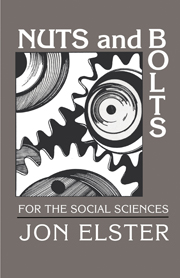Book contents
- Frontmatter
- Contents
- Preface and Acknowledgments
- Part One Introduction
- Part Two Human Action
- II Desires and Opportunities
- III Rational Choice
- IV When Rationality Fails
- V Myopia and Foresight
- VI Selfishness and Altruism
- VII Emotions
- VIII Natural and Social Selection
- IX Reinforcement
- Part Three Interaction
- Bibliographical Essay
- Index
V - Myopia and Foresight
Published online by Cambridge University Press: 05 June 2012
- Frontmatter
- Contents
- Preface and Acknowledgments
- Part One Introduction
- Part Two Human Action
- II Desires and Opportunities
- III Rational Choice
- IV When Rationality Fails
- V Myopia and Foresight
- VI Selfishness and Altruism
- VII Emotions
- VIII Natural and Social Selection
- IX Reinforcement
- Part Three Interaction
- Bibliographical Essay
- Index
Summary
IN the state of nature – a fictitious state much discussed by philosophers and somewhat reminiscent of the island in William Golding's Lord of the Flies – people live in the present and care only about themselves. As a result, their lives, in Hobbes's memorable phrase, are “solitary, poor, nasty, brutish, and short.” No known societies are quite like that. The Ik of Uganda, as described by a social anthropologist who stayed with them for some time, are probably as close to the state of nature as any human group on record, but even they display minimal forms of self-restraint. A major task of the social sciences is to explain why we are not in the state of nature. Here I shall consider foresight – the ability to be motivated by long-term consequences of action – as a possible explanation of self-restraint. Other explanations are discussed later.
I said in chapter III that rational choice is concerned with the outcome of actions. It is often useful to think of an action as generating an indefinite stream of (intended or expected) outcomes or consequences. Suppose that after obtaining a college degree in economics an individual has the choice between studying for a Ph.D. and taking a job in a bank.
- Type
- Chapter
- Information
- Nuts and Bolts for the Social Sciences , pp. 42 - 51Publisher: Cambridge University PressPrint publication year: 1989



